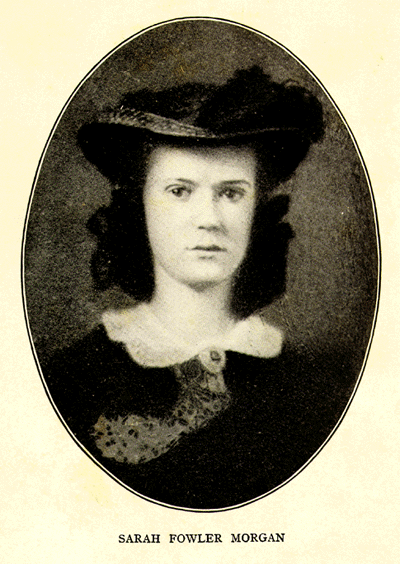
In April 1863, 21-year-old Sarah Morgan, along with her mother and sisters, found herself on a ship headed for the city of her birth, New Orleans. The Morgan family had lived in Baton Rouge for years, but after Union forces took the town the previous August, they abandoned their home and sought shelter with friends. Now, with Sarah and her mother ill, the Morgan women (Mr. Morgan had died in 1861) headed for Union-occupied New Orleans, where Sarah’s older brother, a unionist, resided. As the following excerpt from her diary shows, Sarah was less-than pleased with her arrival among the Yankees:
When we at last entered the canal, I beheld the animal now so long unseen, the Yankee. In their dark blue uniforms, they stood around, but I thought of the dear gray coats…. Immediately a guard was placed on board, we whispering before he came, “Our dear Confederates, God bless them.”
We had agreed among ourselves that come what would, we would preserve our dignity and self-respect, and do anything rather than create a scene among such people. It is well that we agreed. So we whispered quietly among ourselves, exhorting each other to pay no attention to the remarks the Yankees made about us as we passed, and acting the martyr to perfection, until we came to Hickock’s Landing. Here there was a group of twenty Yankees. Two officers came up and asked us for papers; we said we had none. In five minutes one came back, and asked if we had taken the oath. No; we had never taken any. He then took down our names. Mother was alone in the coop. He asked if there was not another. The schooner had fifteen passengers, and we had given only fourteen names. Mother then came up and gave her name, going back soon after.
While one went after our passes, others came to examine our baggage. I could not but smile as an unfortunate young man got on his knees before our trunk and respectfully handled our dirty petticoats and stockings. “You have gone through it before,” he said. “Of course, the Confederates searched it.” — “Indeed, they did not touch it!” I exclaimed. “The never think of doing such work.” — “Miss, it is more mortifying to me than it can be to you,” he answered. And I saw he was actually blushing….
Then came a bundle of papers on board carried by another, who standing in front of us, cried in a startling way, “Sarah Morgan!” — “Here” (very quietly). — “Stand up!” — “I cannot” (firmly). — “Why not?” — “Unable” (decisively). After this brief dialogue, he went on with the others until all were standing except myself, when he delivered to each a strip of paper that informed the people that Miss, or Mrs. So-and-So had taken and subscribed the oath as Citizen of the United States. I thought that was all, and rejoiced at our escape. But after another pause he uncovered his head and told us to hold up our right hands. Half-crying, I covered my face with mine and prayed breathlessly for the boys [three of Sarah’s brothers had joined the Rebel forces] and the Confederacy, so that I heard not a word he was saying until the question, “So help you God?” struck my ear. I shuddered and prayed harder. There came an awful pause in which not a lip was moved. Each felt as though in a nightmare, until, throwing down his blank book, the officer pronounced it “All right!” Strange to say, I experienced no change. I prayed as hard as ever for the boys and our country, and felt no nasty or disagreeable feeling which would have announced the process of turning Yankee.
After the war, Sarah moved to South Carolina, married, and had three children. She died in 1909 in Paris, where she spent the last decade of her life living with her son.
Source: A Confederate Girl’s Diary: Sarah Morgan Dawson (Boston, 1913), 383-383.
Image credit: Documenting the American South (docsouth.unc.edu).
